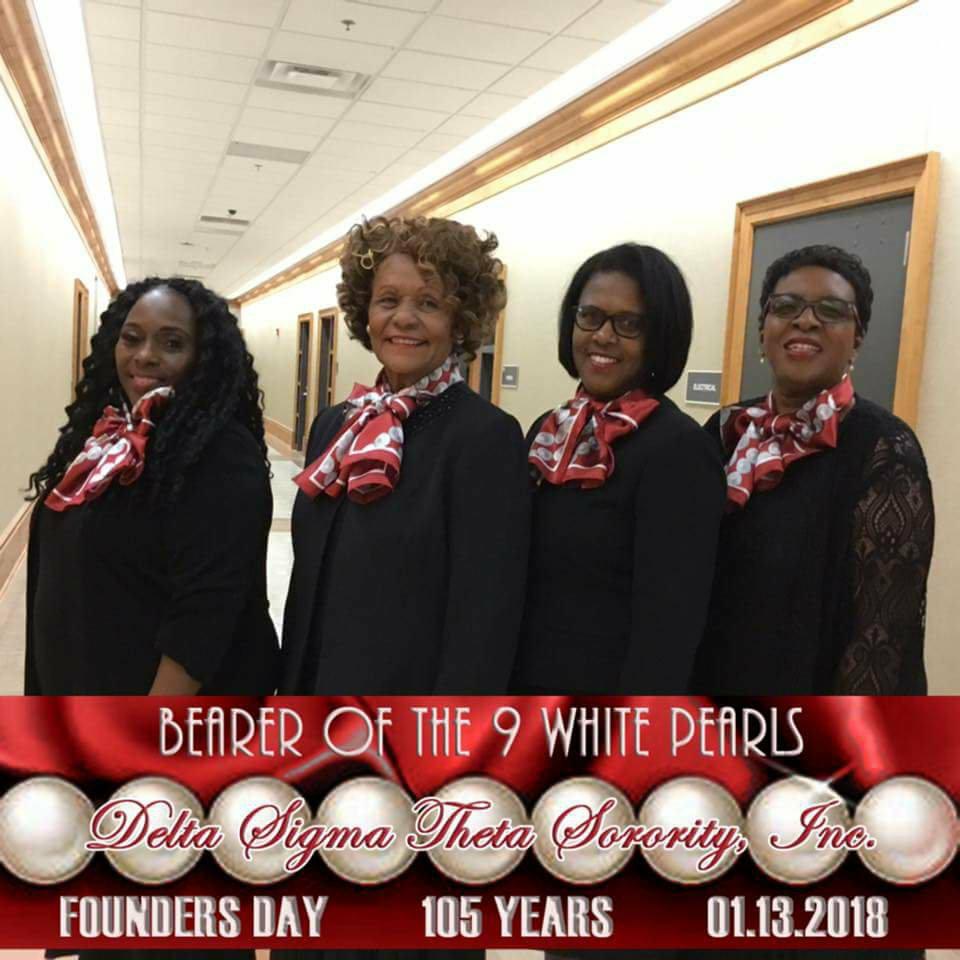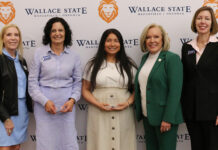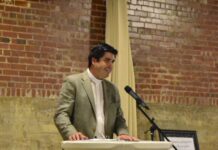Ms. Pearl Jackson Green, second from left, with some of her Delta Sigma Theta sisters in January 2018 / Courtesy of Ms. Pearl Jackson Green
Note to Cullman readers about Ms. Pearl’s Good Samaritan in Cullman County (See “Incident in Cullman County” below.): As the years passed the incident on the bus faded somewhat from Pearl Jackson's mind, but the kindness shown to her that night is something she will never forget. The man who offered her his seat was grown in spring 1953, so it is probably safe to assume that he has passed away. But perhaps he, or another passenger on the bus, talked about it later on. If you have heard this story from a friend or relative, please contact The Tribune. Ms. Pearl would love to express her gratitude to his family.
Ms. Pearl Jackson Green wears many hats. No pun intended, but the lady has a hat collection that rivals any duchess. And she has worn many titles in her time. She was among the first black women from Lawrence County to attend college. Although her first inclination was to study science and become a medical researcher, she later changed her major. She earned a degree in education from Alabama State College in Montgomery and went on to teach in the Lawrence County School System for 20 years. At “80 plus” years of age, she is still teaching. People frequently ask her why she continues. “It’s because I might be able to help some young person,” she replies. You get the feeling when talking to her that she is teaching you things that you might never learn from websites or encyclopedias. In essence, Pearl Jackson Green is a walking, talking history book.
This is her story….
Pearl’s father, John Dyke Echols, was a mechanic. Her mother, Annie Love Echols, was a domestic helper who worked for the Turner and Sims families. She spent much of her time at the Joe Wheeler Plantation for many years. Her father died when Pearl was 14. She was the oldest of seven children, but even though most people of that generation would have had to quit school to help care for the younger siblings, she never wavered in her quest to get an education.
She and her younger siblings walked to school each day from out near where Alabama Highway 157 and Highway 33 intersect to the Rosenwald School near where Freeman Tabernacle Church is today. The school buses ferrying the white children back and forth to a different school passed them by, rain or shine, twice each day. When questioned about this circumstance, Pearl said, “That’s just how it was; no one ever considered that it would change. I was never bitter about it.”
That’s Ms. Pearl’s attitude about much of what took place before the civil rights movement. It’s just the way things were…
She was the first in her family to attend college. She received a scholarship from the local Masonic Lodge, where her father had been a member. She chose to attend Alabama State College in Montgomery.
She left home a young, intelligent black girl, eager to learn and better her lot in life. She would return a woman with an education in more than just the academic sense. She learned how to dress, how to speak in public and how to carry herself in such a way that she commanded, and still commands, respect from the people she interacts with. Along with those admirable characteristics, she learned some hard, harsh truths about life and man’s ability to mistreat and misjudge his fellow man.
Her first lessons in elocution and poise came from her college English professor, Annette Roberts. It was from this kind and elegant New Yorker that Ms. Pearl learned the deportment skills that would see her through life. She credits this professor with seeing something in a young girl that promised great potential and encouraging her young student to reach for the stars.
“She thought that I was more suited to working with people than being shut away in some lab,” said Ms. Pearl, “and she was right. I have always enjoyed working with people.”
So engrained was the religious aspect of her life, it would have been unthinkable not to attend church, wherever she was. So, while at college, and because church was always a central part of her religious and social life for as long as she can recall, she found a church home in Montgomery. It was about a four-block walk from her dorm room, down streets that went from college campuses, to tree-lined family neighborhoods that turned into places where she wouldn’t walk at night, and finally to the downtown area where the Dexter Avenue Baptist Church was located.
Friends at college had recommended this church because of its energetic, forward-thinking, young minister. New to Montgomery, this preacher was from Atlanta, the son of a minister who had imbued him with the ability to instill the gospel into people thirsty for the word, and to impart a new way of thinking, ones which the Bible mentions over and over – loving thy neighbor, treating people as anyone would want to be treated, of all the basic principles of decency and Christianity. His name was Dr. Martin Luther King, Jr.
It was Ms. Pearl’s first experience with hearing about the movement toward equality between blacks and whites. Dr. King’s message was, out of necessity, somewhat shrouded in secrecy.
“There were police outside the church every service, and they would have arrested him for the least little hint of rebellion, so he would write messages on poster boards and hold them up to the congregation as he preached his usual gospel message,” Ms. Pearl explained. “In this manner, he would tell us about the political things we might be seeing and hearing in the near future. If we were supposed to meet somewhere, or not ride the buses, he would communicate these things in this manner to keep those outside from hearing. His sermons were carefully scripted, not to inflame, but to educate people to the idea of integration, without preaching it,” she said.
She saw much of what the history books can only imperfectly convey. She lived in a time that was frightening, dangerous and exciting all at once. She saw the changes that today’s generations only know through old black and white movies (She says that the most accurately depicted movie she has seen of the tumultuous times of the 60s is Selma.” “They got the feeling just about right,” said Ms. Pearl) and documentaries that show dogs set upon children and old women being displaced from busses.
As a child and a young woman, Pearl was required to drink from “colored” water fountains, use “colored” restrooms, sit in the balcony of the local theater, and was not allowed in some white establishments like restaurants and hotels. But as a young college student, she was acutely aware of the changes taking place; she was around when Dr. King walked across the Edmund Pettus Bridge to Selma, and when Eugene ”Bull” Connor turned Birmingham, Alabama into the focus of hatred and bigotry, a stigma that it has taken scores of years to live down, and when news of the Freedom Riders was splashed over the front page of newspapers all across the country; she remembers it all vividly.
One of the most hateful acts during those years of struggle will be forever etched into her mind. People all over the world were shocked when news of the 16th Street Baptist Church bombing hit the airwaves in 1963. Although the deaths of four innocent little girls and the place chosen for the attack were a shock, the bombing itself was not totally unexpected. “Dr. King’s home had already been bombed,” she pointed out. But this act of pure hatred was so awful that it touched even the hardest of hearts. “The mood all around us was tense. It was a frightful time.” Still, she was never bitter, just concerned for people of all races, yet eager for the promises of a better life that Dr. King’s dream portrayed. All over the nation, rioting and violence reigned. The South, where people pride themselves on their hospitality, was the focus of these tumultuous times.
Ms. Pearl was never a part of the violence, never one to promote hatred. “I was never a ‘stand in the street with your fist raised’ kind of person,” she said quietly. “I was more effective talking to people one on one across the table.”
She proved that to be true many times in her personal and professional life. But before that happened, she would be the victim of true prejudice and hate, through no fault of her own, save the beautiful café au lait color of her skin.
Incident in Cullman County
In the spring of 1953, headed home on a break, Ms. Pearl was seen off at the Montgomery bus station by some of her college sorority sisters. They had just presented her with a beautiful hat, kept safe inside a new hat box. She had her personal belongings in her purse, and a heavy suitcase. The trip was uneventful until around 8 p.m. when the bus was on a desolate rural road in what could possibly have been Cullman County. Ms. Pearl just remembers that they had already passed through Birmingham a while before the following incident occurred.
“A white man offered me his seat on the bus,” she said. “When the bus driver noticed what was going on, he immediately stopped the bus and instructed the man not to give me his seat.” The driver used some derisive language when ordering the man to get back into his seat.
Ms. Pearl, not wanting to draw more attention, would have gladly stood the rest of the way to Decatur, but things didn’t turn out that way.
The bus driver and the man continued to have words, their emotions escalating to the point of shoving and calling names. Ms. Pearl was horrified to be the subject of the controversy. Finally, the bus driver ordered her off the bus. The other man leaned over and whispered, “Get in the ditch and wait there, someone will come for you.”
She gathered her hat box, her purse and suitcase and made her way out the door of the bus and onto the dark, deserted roadside. “It was in the middle of nowhere,” she recalled.
She was conservatively dressed, in a navy-blue suit, a nice hat and high heels, as she always was when traveling, but she followed the man’s instructions to the letter. She cautiously put her immaculate shoes into the scrub grass at the side of the asphalt and gingerly stepped down the embankment, not knowing if there were snakes or other critters sharing the space with her. She carefully arranged the hat box and suitcase beside her, and half-sitting, half-crouching in the ditch, attempting to save her hosiery from briars, she settled down to avoid being seen. As the darkness deepened around her, she heard the wind whispering eerily through the trees and was constantly unnerved by rustlings in the tall grass. Terrified and shivering with anxiety and the cold, she carefully removed her hat, and she waited…
For what seemed like hours, and was in fact at least three or four hours, Ms. Pearl waited in the dark, listening to the sounds coming from the fields beyond. Scared, hungry and alone, the young girl watched and listened for sounds of a vehicle coming, but it would be hours before she saw headlights approaching from the south…
“Out of nowhere, there was a bus,” she recalled. “It stopped right where I was in the ditch and the doors swung opened. No one said a word. I got my things and walked up the embankment, got on the bus and still no one said a word. We rode all the way to Decatur in silence, no one ever asked me for a ticket, or money for bus fare, or anything. It was as if I wasn’t there.”
When Ms. Pearl arrived in Decatur, her frantic mother and uncle were waiting at the bus station. They had been there all night long. As upset as they were with her being so late, at first, they didn’t believe her story. They thought she might have been at a party or something like that and caught a later bus. Finally, they were convinced that she was telling the truth.
“Years later I tried to find the man who wanted to give me his seat. I have wondered if maybe he was the driver of the second bus, but I just don’t know, and not having asked his name, there was nowhere to start looking. I would love to meet him and thank him,” she said pensively.
Finishing college
Back at school she joined the choir, becoming one of the 35 members of a traveling choral group. She sang high soprano and could even manage a little alto when necessary. She took music lessons along with her regular classes, and she was part of a work/study program in which she worked for the school to help pay her tuition.
She was voted into a sorority, Delta Sigma Theta, to which she still belongs to this day. With these intelligent, like-minded women she formed lasting relationships that would be important in the days and years to come.
All around them the civil rights movement was taking place, making national headlines and changing the country, but for the college students in her circle, and herself, getting ahead meant making sure that their education came before anything else. “Everyone looked out for everyone else, there were no uppity attitudes at that time and place, we all wanted to keep up our grades and graduate with honors,” she said earnestly. “We strived to achieve excellence in our studies.”
Pearl’s English professor continued to mentor her. She encouraged her, along with friends, to enter some school-sponsored beauty contests. In her freshman and sophomore years Ms. Pearl won top honors in these pageants. She was a natural beauty, with straight, even white teeth and a dazzling smile. Not only did these events garner her prizes, more importantly, they increased her self-esteem and gave her the ability to get up on a stage and hold her head high while walking in stiletto heels and evening attire, which isn’t as easy as it looks on television.
She joined Toastmasters, where she learned to use body language and her hands to get her point across. These skills would serve her well in her working career.
At the age of 20, Pearl Jackson graduated with a degree in education and moved back home to Lawrence County to live and work. One of the first things she did, after getting a driver’s license, was to attempt to register to vote. It was harder than she thought it would be…
Look for part two of Ms. Pearl’s story in the next issue of The Cullman Tribune.
Copyright 2018 Humble Roots, LLC. All Rights Reserved.






























